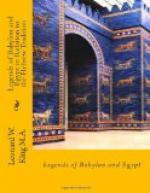If the ninth line of the poem be restored as suggested, its account of the Birth of the Gods will be found to correspond accurately with the summary from Berossus, who, in explaining the myth, refers to the Babylonian belief that the universe consisted at first of moisture in which living creatures, such as he had already described, were generated.(1) The primaeval waters are originally the source of life, not of destruction, and it is in them that the gods are born, as in Egyptian mythology; there Nu, the primaeval water-god from whom Ra was self-created, never ceased to be the Sun-god’s supporter. The change in the Babylonian conception was obviously introduced by the combination of the Dragon myth with that of Creation, a combination that in Egypt would never have been justified by the gentle Nile. From a study of some aspects of the names at the beginning of the Babylonian poem we have already seen reason to suspect that its version of the Birth of the Gods goes back to Sumerian times, and it is pertinent to ask whether we have any further evidence that in Sumerian belief water was the origin of all things.
(1) {ugrou gar ontos tou pantos kai zoon en auto gegennemenon (toionde) ktl}. His creatures of the primaeval water were killed by the light; and terrestrial animals were then created which could bear (i.e. breathe and exist in) the air.
For many years we have possessed a Sumerian myth of Creation, which has come to us on a late Babylonian tablet as the introductory section of an incantation. It is provided with a Semitic translation, and to judge from its record of the building of Babylon and Egasila, Marduk’s temple, and its identification of Marduk himself with the Creator, it has clearly undergone some editing at the hands of the Babylonian priests. Moreover, the occurrence of various episodes out of their logical order, and the fact that the text records twice over the creation of swamps and marshes, reeds and trees or forests, animals and cities, indicate that two Sumerian myths have been combined. Thus we have no guarantee that the other cities referred to by name in the text, Nippur, Erech, and Eridu, are mentioned in any significant connexion with each other.(1) Of the actual cause of Creation the text appears to give two versions also, one in its present form impersonal, and the other carried out by a god. But these two accounts are quite unlike the authorized version of Babylon, and we may confidently regard them as representing genuine Sumerian myths. The text resembles other early accounts of Creation by introducing its narrative with a series of negative statements, which serve to indicate the preceding non-existence of the world, as will be seen from the following extract:(2)




